Ex Libris and IGeLU have agreed a framework for product enhancement known as the Product Development Collaboration Agreement. This sets the framework for enhancement processes to be followed for the various Ex Libris products, and allows for voting by IGeLU members on product development priorities.
A summary of the process is as follows
- Community enhancements are submitted to the Enhancement Portal
- Relevant product working group will review the enhancements ensuring that there are no duplicates of incomplete enhancement requests. This may involve requesting additional from teh requestor.
- List of requests are then submitted to the community for ‘voting’ via the Voting Platform
- Top 20 voted requests are then sent to the Ex Libris product manager for ‘development’ pointing.
- Ex Libris allocate ‘development’ points for each enhancement – points are based on the effort required to scope, develop and test the enhancement request
- Ex Libris returns the list back to the working group along with the ‘development’ points for each request
- List of the pointed requests are then submitted to the community for ‘voting’ via the Voting Platform
- Final list of developments are then submitted to Ex Libris for development into the product.
The above is the normal process, however for some products only a single round of voting is required. This may be determined by such factors as the total number of enhancements submitted by the community.
This process is different to the Ex Libris Ideas Exchange where there is no guarantee that top voted requests will be developed.
CERV – Community Enhancement Request and Voting System
The CERV process is made up of two separate platforms. These are
- Enhancement Portal
- Voting platform

CERV – Enhancement Portal
Community submitted enhancements are submitted via this portal.
User Documentation on the Enhancements Portal is located at https://igelu.org/wp-content/uploads/2024/10/Ex-Libris-Users-Enhancements-Portal-Manual.docx.pdf
Submitted enhancements must meet a minimum set of requirements. The CERV Enhancement Rejection Policy (https://igelu.org/wp-content/uploads/2024/12/CERV-Enhancement-Rejection-Policy.pdf) provides a basic guideline which can be used by the Working Groups when deciding to reject or modify a submitted enhancement request.

CERV – Voting Platform
Voting for community submitted enhancement requests is handled by this platform.
The voting system will send out an ’email’ with a special ‘voting url’. The ‘voting url’ will be used to access the voting platform and will allow you to cast your votes.
The emails will be sent to the contact person’s email held in the IGeLU membership database
If you did not receive a voting email for a product that you have licensed or if the contact person in the IGeLU membership database is on leave or has changed then please let us know as soon as possible by sending an email to elections@exlibrisusers.org with the following information
- your Institution name
- IGeLU membership ID (if known)
- licensed product name
Some notes about the platform
- Product voting is driven by your IGeLU membership profile so it is important that your list of licenced products is current
- Emails will be sent to the contact person’s email held in the membership database
- The platform will send out reminders if your institution has not voted
- The platform will know if your institution has voted but we cannot tell how you have voted
- The voting emails will be sent from the ‘electionbuddy.com’ email domain.
- Please check your junk mail, spam folder or institutional spam system if you have not received the voting email
One institution-one vote
IGeLU and ELUNA member institutions get one vote per institution according to our enhancement agreement with Ex Libris, regardless of an institution membership in one or both user groups.
Consortia arrangements may allow –
- Proxy voting for the whole consortia
- Individual voting by each of the consortia institutions.
See Consortia Membership for more information.
